|
|
Post by berkley on Aug 10, 2014 19:45:09 GMT -5
I might have to give Scorpion a try. I really like Marini's artwork, but have held off this one because I wasn't sure about the story. Is Scorpion the only thing he's been working on lately? I've read a few of his "Gipsy" books and one about vampires that I forget the title of.
|
|
|
|
Post by Dizzy D on Aug 11, 2014 3:40:43 GMT -5
I think he's currently working at least on the Scorpion (though it's been a while since the last issue) and the Eagles of Rome (written by Marini himself BTW).
Edit: And the Scorpion is written by Desberg, who is a remarkably better writer than Thierry (writer on Gypsy), though I tend to find him pretty uneven (loved his Gaspard de la Nuit, hated his I.R.$.). For Dufaux (writer on Raptors), my feelings are about the same; quite diverse writer both in subject as in quality.
|
|
|
|
Post by hondobrode on Aug 11, 2014 7:50:44 GMT -5
Thanks so much for this thread Dizzy !
Most of what you guys have posted here I don't know about.
Comixology has an agent in France dealing directly with publishers, and Comixology has been surprisingly strong in posting French material.
All great, but I want mine translated. I'm sure it will eventually happen, and there a whole other avenue of wonderful entertainment.
|
|
|
|
Post by the4thpip on Aug 11, 2014 7:54:28 GMT -5
Eagles of Rome is that homoerotic thing, right? I think I have the first two volumes unread on a shelf somewhere.
|
|
|
|
Post by Dizzy D on Aug 11, 2014 7:56:54 GMT -5
Eagles of Rome is that homoerotic thing, right? I think I have the first two volumes unread on a shelf somewhere. Yep, that's the one. |
|
|
|
Post by foxley on Aug 11, 2014 8:29:51 GMT -5
The thing I liked about most in the Scorpion was that during the first issue I started wondering why he went through such trouble to get relics for his clients when he could just as easily fake them (the Scorpion had already been established as a person who had little respect for his clients nor for the law), but almost immediately after I asked myself the question, the story made it clear that the Scorpion being a genuine expert on relics would be important to the plot. Yeah, the Scorpion being an expert on relics is vital to the plot. But it also makes sense given what learn of his personality that it is a point of pride to him that he delivers genuine relics, even if his clients do not appreciate them. It is a neat piece of characterisation as there are multiple points in narrative where the sensible thing to do would have been to walk away, but his pride and stubbourness won't let him. |
|
|
|
Post by fanboystranger on Aug 11, 2014 13:40:47 GMT -5
I finally got around to reading Jodo and Bess' White Lama in its new beautiful new HC edition from Humanoids. It's really a great book, and Bess provides some of the finest artwork I've ever seen. It does follow the usual Jodo mystical preoccupations, but those preoccupations aren't too far removed from the Tibettan and Buddhist folklore the book centers on. I highly recommend it. It doesn't get the attention that much of Jodo's other work gets, but I think it's every bit as good (and in many ways, better).
|
|
Roquefort Raider
CCF Mod Squad
Modus omnibus in rebus
Posts: 17,409  Member is Online
Member is Online
|
Post by Roquefort Raider on Aug 17, 2014 10:39:07 GMT -5
Hugo Pratt is an Italian cartoonist, and I don't think it's an exaggeration to put him on the same pedestal as Foster, Eisner or Raymond. In fact, I don't think it would be irrational to put him on the same level as Hemingway, when it comes to certain parts of his work. He's better known than many other European cartoonists in the US (he was inducted to the Will Eisner Hall of Fame in 2005) but I don't think his books have been available in English for a while, now, and anyway most of his output was not transtated in English. (Which is really, really, unfortunate)! Pratt had an interesting life, which provided some material for his tales of exotic adventure. As a kid he lived in Venice and then in Italy-occupied Ethiopia; he was interned in a prison camp in WWII. As a cartoonist, he worked in Argentina with the famous Hector Oesterheld and then in England before returning to Italy. He remained an active traveler all his life.  His style is very elegant, almost sketchy, but carries tremendous emotional force and can convey a mood like nothing else. It works quite well in black and white (and some purists insist that it should always be in B&W), but personally I also like Pratt's subtle work with colors. (The big hardcovers collecting his stories usually include many watercolor sketches -Pratt did a lot of studies before starting a tale).  Storywise, Pratt favors Hemingway-like tales of adventure featuring tough-talking and very colorful characters (men and women alike). He also likes to input a little politics in his stories, as well philosophy, and a lot of arcana. I'm sure he and Howard Chaykin would have seen eye to eye. But it's not all action; in fact, while he goes for high drama, he doesn't do a lot of action scenes. He prefers to create tension using dialog and plot, and has a thing for bittersweet endings. Pratt created may characters, but the most famous will always remain Corto Maltese. Corto is a sea captain, but a sea captain without a ship. (His boat burned down in his very first solo adventure, as I recall). His status as a seaman helps him maintain a certain aura as a romantic figure, one who endlessly travels the world. And Corto will indeed see a lot of the world. 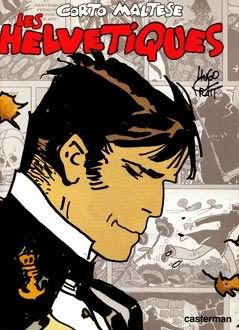 Funnily enough, he was created as a supporting character in a tale of piracy on the south seas, "The ballad of the salted seas", which was really about a scion of a noble English family who had turned to piracy and ended up reclaiming his honor. But Corto (and, to a lesser extent, the infamous pirate Rasputin) were so well-received that Pratt kept them going. In that sense, Corto Maltese is like another famous comic-book sailor: Popeye himself.
|
|
Roquefort Raider
CCF Mod Squad
Modus omnibus in rebus
Posts: 17,409  Member is Online
Member is Online
|
Post by Roquefort Raider on Aug 17, 2014 10:40:39 GMT -5
The French weekly comic journal Pif Gadget published many of the early Corto Maltese stories. (Pif was an outlet for the French Communist Party, which explained its red cover; but honestly, reading it as a kid, I would never have known that this cool periodical was associated with the nefarious red menace)! Later on, other journals such as Tintin and À suivre published the character, and finally Corto went straight to hardcovers. So, what's it about? Well, Corto Maltese is a typical romantic adventurer with a (falsely?) cynical world view. Sometimes he hunts for treasure, sometimes he looks for Atlantis, sometimes he helps widows and orphans. He's resolutely against imperialism and fascism, but is no boy-scout and is on a first-name basis with Joseph Stalin. He seems to wander the world in search of the next horizon. His friends or acquaintances are many : Bouche Dorée the canbdomblé priestess; Prof. Steiner the archaeologist and specialist on Mu and Atlantis; Rasputin the insane anarchist and pirate; Cush the Danakil revolutionary and many kabbalah experts, spies, secret agents and authors (such as Jack London). From time to time, Corto also lives oneiric adventures that got him to interact with the characters from A Midsummer's night's dream or from Wolfram von Eschenbach's Parzifal. He went from the battlefields of WWI to those of the Russo-Japanese war (though obviously not in that order!), from the jungles of South Americ to the steppes of Central Asia, from the deserts of the Middle East to the islands of the Pacific. And I don't think he had one boring adventure. The fallen angel Shamaël, whom he met in Ethiopia, claimed that Corto had slashed a false chance line in his palm using his father's razor, and that he was "a man carrying a sadness". What it is we never knew. (Corto was clearly romantically attracted to only one woman in all the series, and that was way back in "the ballad of the salted sea"). Here is the introduction of Corto in "the ballad of the salted sea". The bearded guy is Rasputin; here he just seems evil, but in later adventures he was depicted as more than a little insane (often amusingly so, as in "will shoot anyone for any reason at the most unexpected moment" insane). 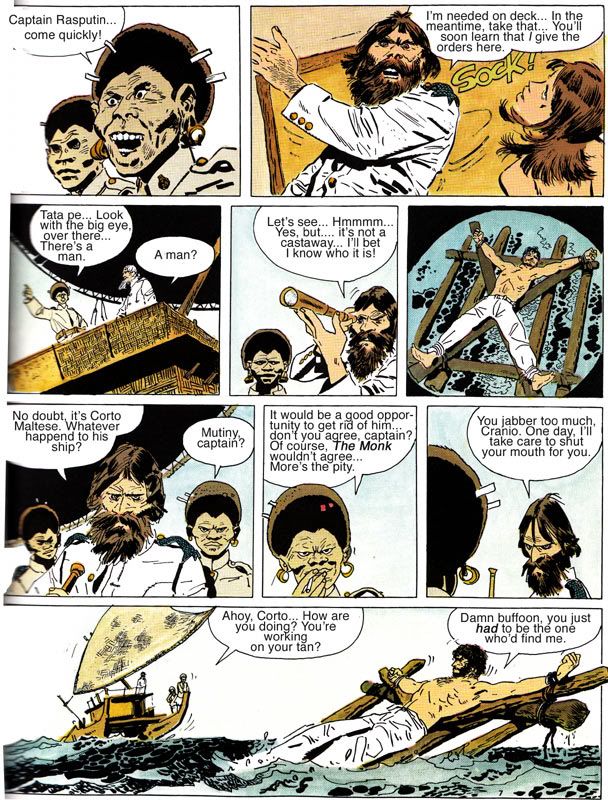 Note that this is an early story, and Pratt' style is not yet as clean as it will later be (he went for a quasi-photographic approach for a few panels in this book). 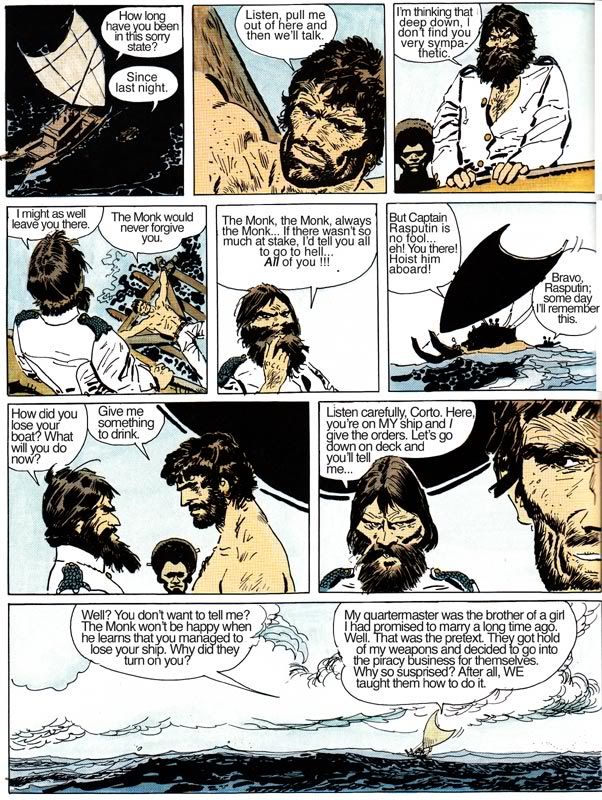 The tone is already there : a sort of simmering violence, of constant threat... You never know if these guys won't turn on you. |
|
Roquefort Raider
CCF Mod Squad
Modus omnibus in rebus
Posts: 17,409  Member is Online
Member is Online
|
Post by Roquefort Raider on Aug 17, 2014 10:41:08 GMT -5
Pratt may write dialog sharp dialogs, but he's no slouch when it comes to visual poetry. The sea is often pictured in "the ballad of the salted sea", to no one's surprise I'm sure. But it's not just a flat expanse of blue... it's a living sea, with swells, waves, fish and seabirds. In a particular scene, two characters spent many pages on the Pacific, guided by the fin of a shark. (Tarao the Maori explains that sharks are friendly to his people, and that they can guide them to wherever they want to go. I would not have trusted such a guide not to eat me, but it made for a very good sequence). 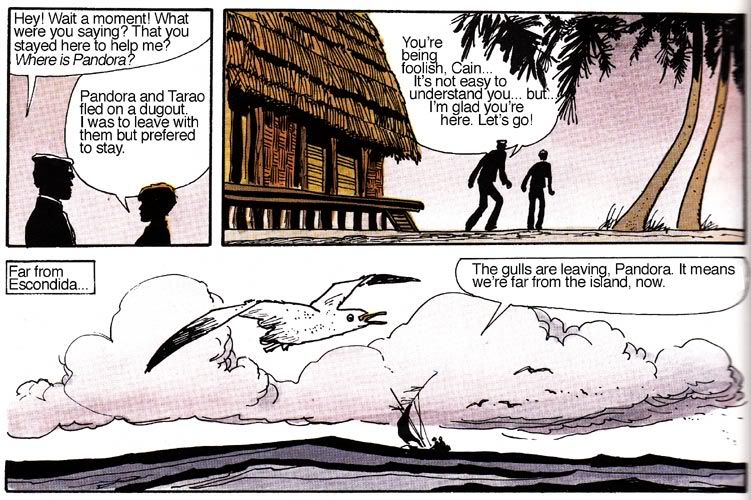 Look at how the sea is drawn... There is a great economy of lines, here, but the mood is beautifully rendered. (I often judge a cartoonist's talent by how few pen strokes he or she needs to do justice to a scene). 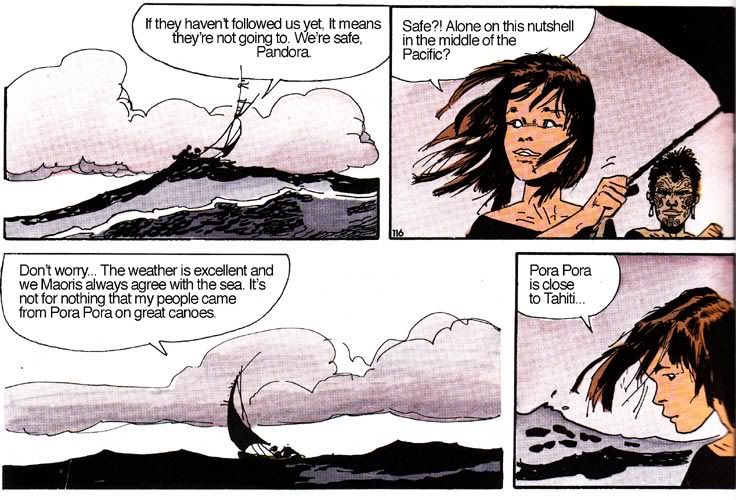 |
|
Roquefort Raider
CCF Mod Squad
Modus omnibus in rebus
Posts: 17,409  Member is Online
Member is Online
|
Post by Roquefort Raider on Aug 17, 2014 10:42:20 GMT -5
Pratt's storytelling abilities are mazing. His comics could often be used straightaway as storyboards for a movie. The following sequence shows the start of a story. Witness the elegance and efficiency with which the author sets up the situation and the characters. It's all effortless, but very effective (and really makes one want to know what happens next). 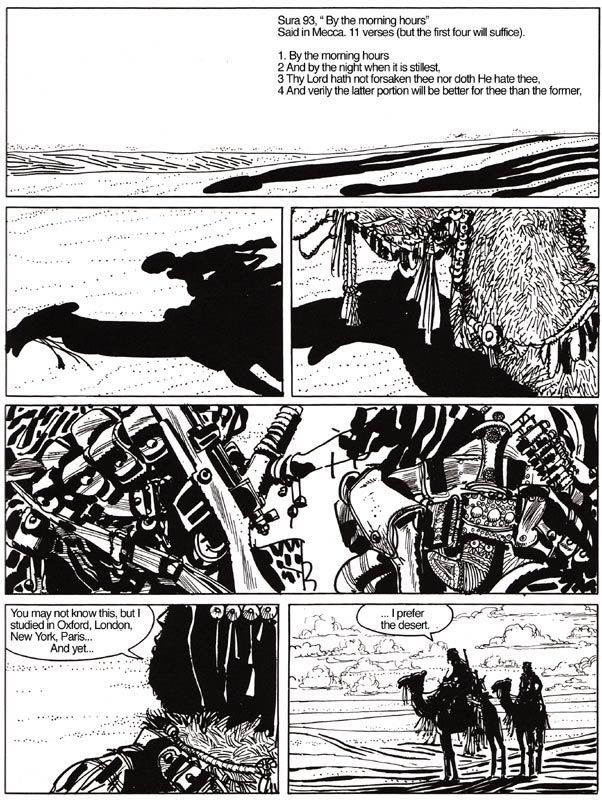 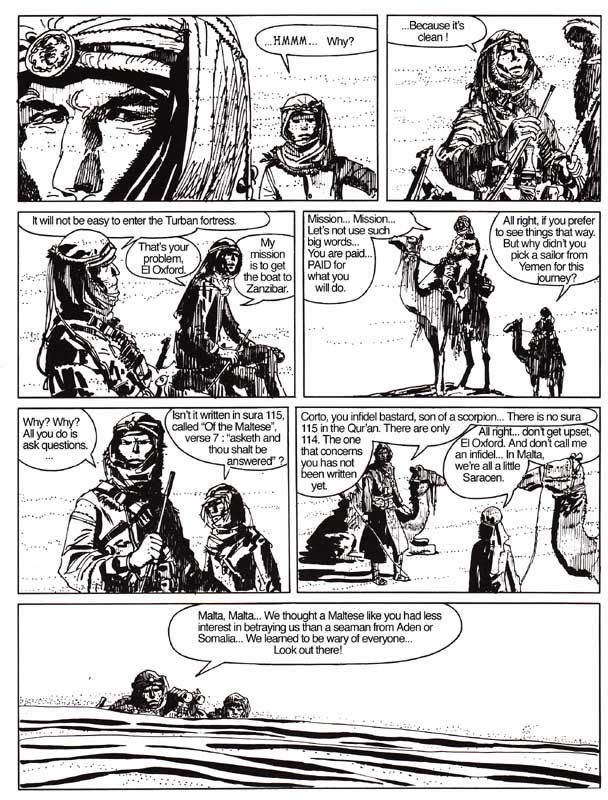   |
|
Roquefort Raider
CCF Mod Squad
Modus omnibus in rebus
Posts: 17,409  Member is Online
Member is Online
|
Post by Roquefort Raider on Aug 17, 2014 10:44:57 GMT -5
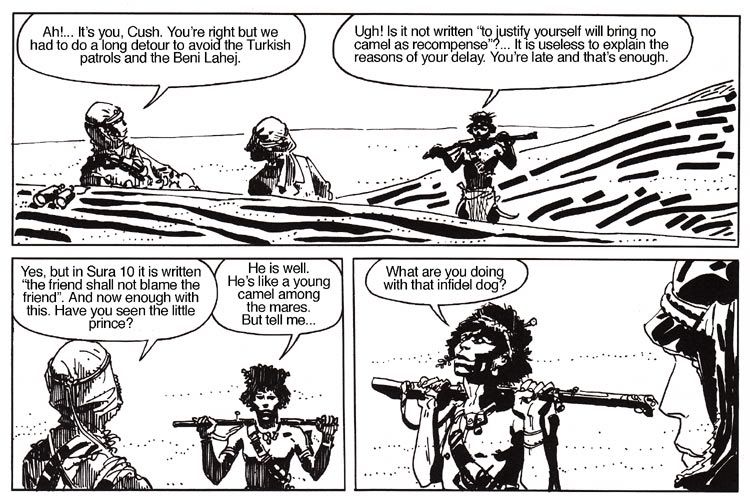 That newcomer is Cush, of the Beni Amer tribe. He's my favorite supporting character. So cool you'd swear he had ice water in his veins. He's a muslim revolutionary, a disciple of the mad mullah, and a very dangerous man. Even his mother says he should not have been born, because of all the widows and orphans he's made! (Although you can tell that this is more of a compliment than an insut). Luckily, he's a man of his word, takes matters of honor very seriously, and is wise enough to know that if your enemy is also the enemy of a worse enemy, then a compromise may be reached (if temporarily). 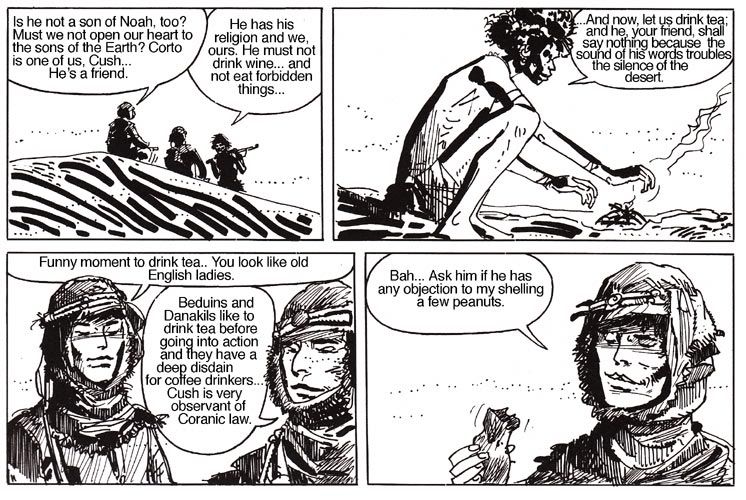 At the end of this story (which includes the attack of the fort, Corto Maltese impersonating a muezzin so badly that the praying crowd think he's drunk, and more than a few deaths, there's a typical Cush scene. As Corto rejoins him and the rescued prince Saoud, he asks why the Danakil keeps annoying the prince with the end of his camel whip. Answers Cush : "because when he's grown up it won't be possible anymore". |
|
Roquefort Raider
CCF Mod Squad
Modus omnibus in rebus
Posts: 17,409  Member is Online
Member is Online
|
Post by Roquefort Raider on Aug 17, 2014 10:45:20 GMT -5
Here's another excellent piece of storytelling.  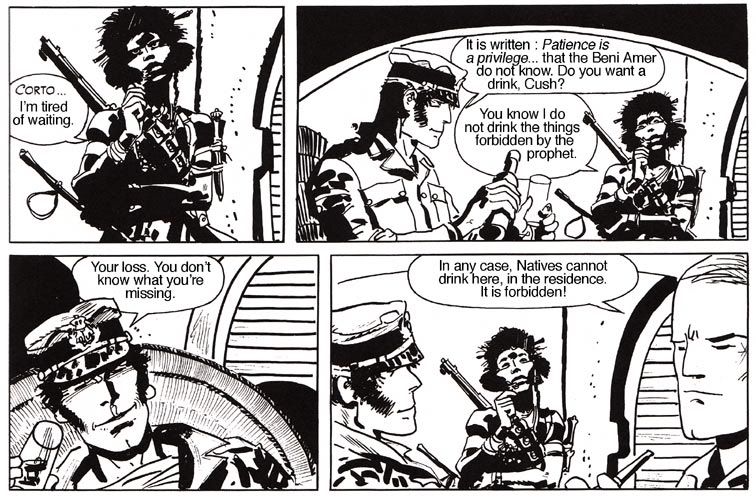 Note how Cush tolerates Corto's friendly ribbing. He wouldn't have done that at an earlier stage in their friendship. But that doesn't mean the Danakil has grown soft. Captain Bradt has just committed a serious mistake by stating that he, a foreign invader on this land, was in any position to forbid Cush to do anything. |
|
Roquefort Raider
CCF Mod Squad
Modus omnibus in rebus
Posts: 17,409  Member is Online
Member is Online
|
Post by Roquefort Raider on Aug 17, 2014 10:46:25 GMT -5
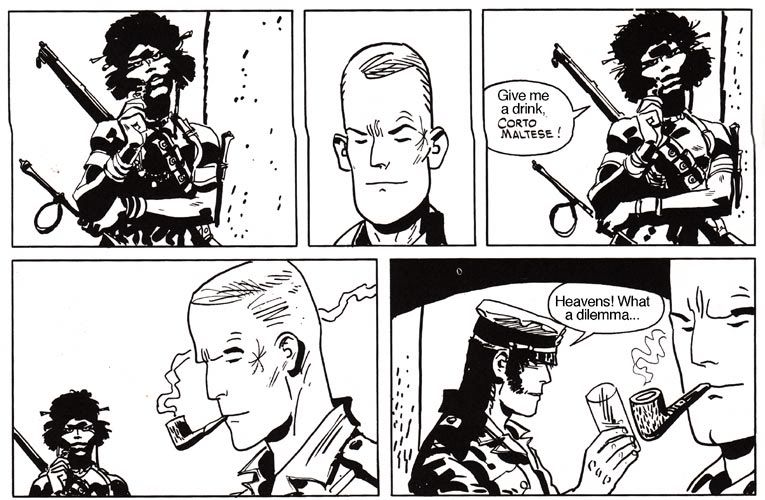 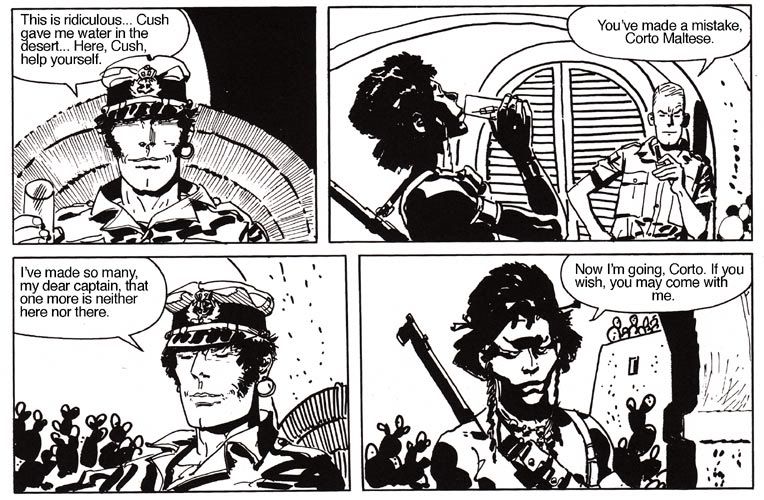 Holy crap, this is why I love comics. See how the silence grows heavy in the first few panels, and how the characters don't move at all. And see how Cush, the integrist religious warrior, is ready to commit a sin just to give the finger to the imperialist. 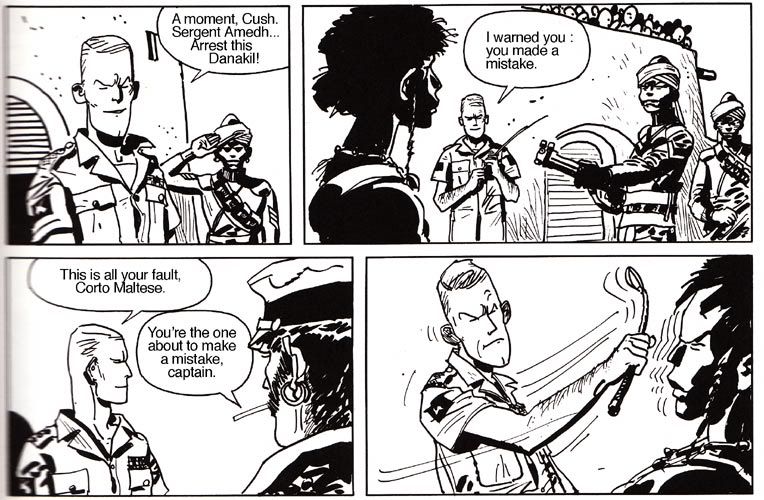 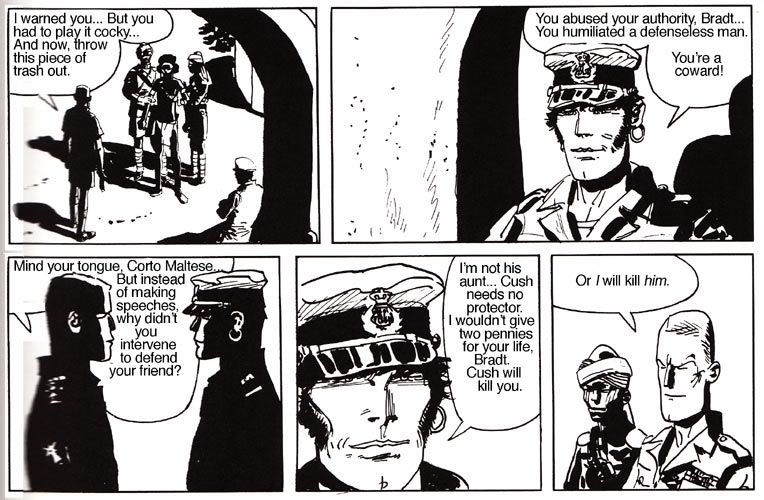 Shades of the Hemingway type of manhood again: "my friends are real MEN! They don't need NANNIES!" Needless to say, Corto's prediction will turn out to be true. Gruesomely so. |
|
Roquefort Raider
CCF Mod Squad
Modus omnibus in rebus
Posts: 17,409  Member is Online
Member is Online
|
Post by Roquefort Raider on Aug 17, 2014 10:48:14 GMT -5
It's not all tough guys doing their Humphrey Bogart bit, though. Pratt's work is full of references to Jewish lore, Argentinian tango, communist politics, legends of lost cities, Brazilian religions, and more. Here we get a bit surreal (with a Thomas More reference, which rarely gets mentioned in, say, Youngblood). 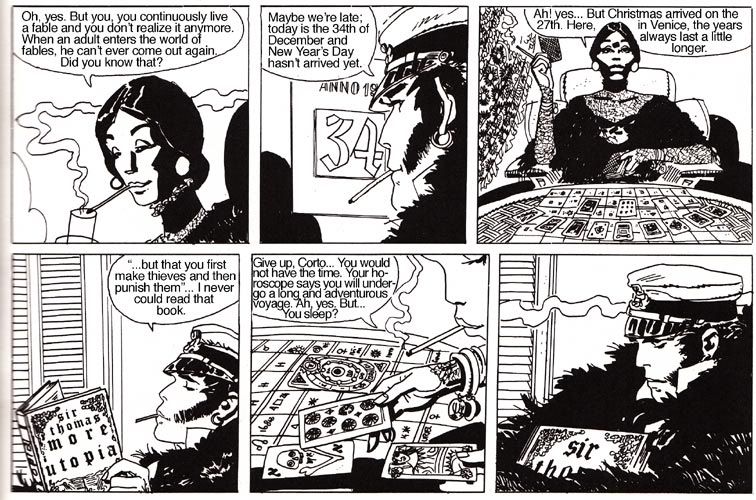 ![]() A lot could be said about this character, but let's move on to a few others. First, for a better overview, there's this site . Pratt was behind the frontier adventures of Sgt. Kirk and Jesuit Joe as of those set in Fort Wheeling; he gave us the shenanigans of Ann of the Jungle, and more than a few standalones (such as a chronicle of the last days of St-Exupéry). One of his character had a lot of success : Koinsky, a Polish soldier serving in the british army during WWII. He, too, was initially only one of many characters in a series called "Scorpions of the desert". Koinsky's adventures all occur in the desert, and are unusual as a war story in that the enemy is almost never the Germans : it's always the Italians.  Well, "the enemy"... this is also an unusual war story in that it's not a story about battling the enemy. It's mostly about spying, about trafficking, about how a few individuals try to make their fortunes in war-torn eastern Africa. Corto Maltese was around during world war I; Koinsky serves during world war II. But both men meet a certain Danakil. In this sequence, Koinsky, Cush and a certain Italian renegade named Stella are looking for a chest of gold that was stolen from a caravan and hidden in the desert. 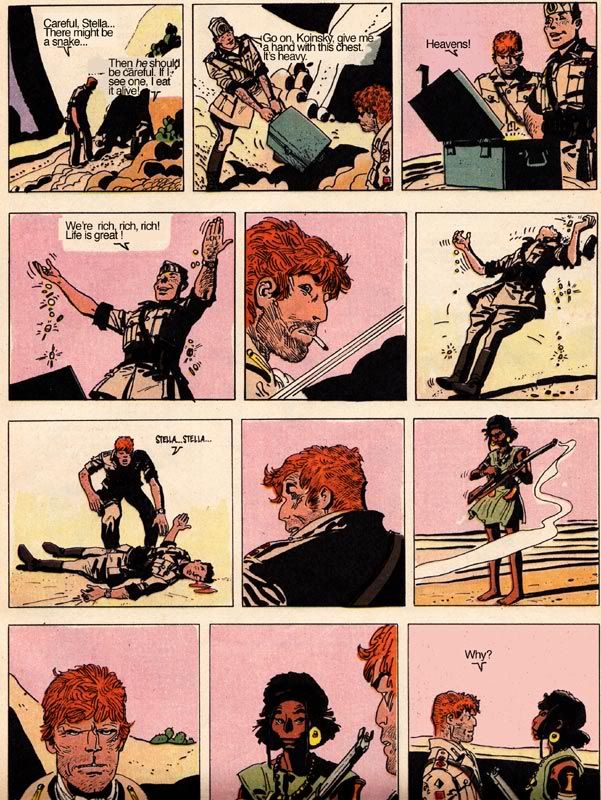 |
|